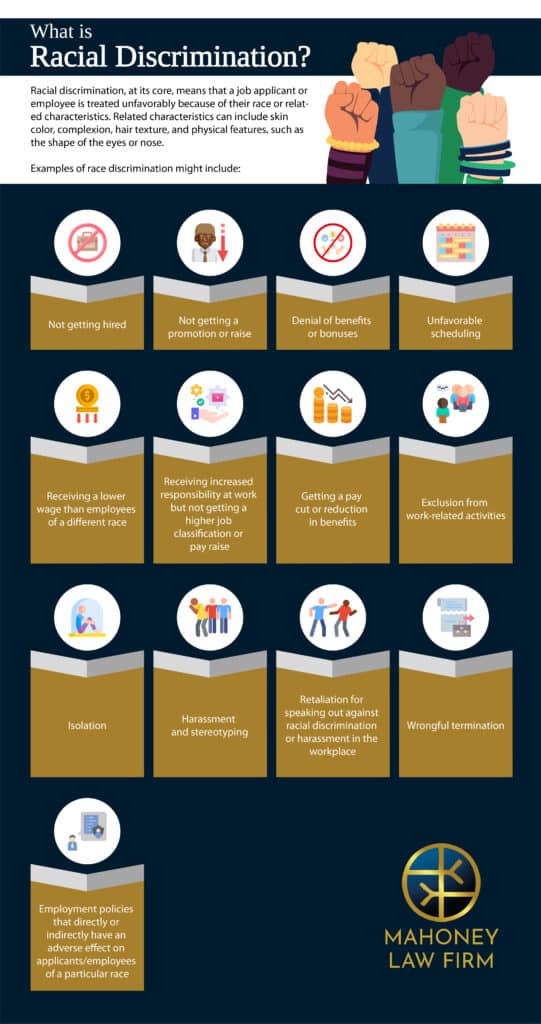Illinois Racial Discrimination Lawyer
Employers in Illinois are prohibited from discriminating against applicants and employees on the basis of race. If you’ve been treated unfairly in an Illinois workplace, an experienced racial discrimination lawyer can help you fight back.
Have you been discriminated against at work in Illinois because of your race? Whether you’ve been denied a job, passed over for a promotion, harassed, or fired, it’s important to understand your legal rights and options. You may have the right to file an employment claim against your employer, and an experienced Illinois employment discrimination lawyer at the Mahoney Law Firm will help you fight for the outcome you deserve.
For more than 16 years, attorney Ryan Mahoney has been dedicated to helping aggrieved workers fight back against racial discrimination in the workplace in Illinois. He understands how difficult it can be to stand up and speak out against powerful employers and corporations. It’s his mission to provide his clients with the support and opportunity they deserve to make things right.
Contact our law office, conveniently located in Madison County, Illinois, to arrange a time to discuss your racial discrimination case. Your first consultation is absolutely free, so don’t hesitate to call our team today.
What is Racial Discrimination?
Racial discrimination, at its core, means that a job applicant or employee is treated unfavorably because of their race or related characteristics.
Related characteristics can include skin color, complexion, hair texture, and physical features, such as the shape of the eyes or nose.
Examples of race discrimination might include:
- Not getting hired
- Not getting a promotion or raise
- Denial of benefits or bonuses
- Unfavorable scheduling
- Receiving a lower wage than employees of a different race
- Receiving increased responsibility at work but not getting a higher job classification or pay raise
- Getting a pay cut or reduction in benefits
- Exclusion from work-related activities
- Isolation
- Harassment and stereotyping
- Retaliation for speaking out against racial discrimination or harassment in the workplace
- Wrongful termination
- Employment policies that directly or indirectly have an adverse effect on applicants/employees of a particular race
Racial discrimination can be direct or indirect. For instance, you’d be the victim of direct racial discrimination if you were harassed at work because of the texture of your hair or weren’t hired because of your race.
On the other hand, you’d experience indirect discrimination if an employer had policies in place that put you at a disadvantage because of your race. For instance, imagine an employer’s policy required employees to speak English at work. An Asian applicant, who immigrated from Japan, goes in for a job interview and speaks perfect English, but notes that it is his second language. Despite meeting all of the job requirements, he’s denied the position, and the company hires a white applicant instead.

What State and Federal Laws Protect Against Race Discrimination in Illinois?
You have protections against race discrimination in the workplace under both Illinois State and Federal law.
Illinois Human Rights Act
The Illinois Human Rights Act (IHRA) prohibits employers from discriminating against applicants and employees because of their “actual or perceived race.”
If you bring a racial discrimination claim under the IHRA, you can seek equitable relief and actual damages.
Equitable relief involves forcing your employer to take some sort of action, like hiring you for a position, reinstating you if you’ve been fired, or giving you a promotion.
Actual damages are monetary damages that are awarded to make up for the financial losses and emotional distress you’ve experienced because of the discriminatory treatment. This can include money for back pay, front pay, lost benefits, and more.
Title VII of the Civil Rights Act of 1964
Federal law also prohibits employers in the state of Illinois from harassing or discriminating against an employee “on the basis of race.”
If you bring a racial discrimination claim under Title VII of the Civil Rights Act, you can recover actual damages, compensatory damages for emotional distress, and punitive damages.
Why Should I File a Race Discrimination Claim?
You don’t deserve to be harassed or treated differently at work because of your race. Under the law, your employer is prohibited from engaging in or supporting these types of behaviors in the workplace. If you believe that you’ve been the victim of racial discrimination at work, it can be important to assert your rights and hold your employer accountable.
By filing a race discrimination claim in Illinois, you can:
- Recover damages for the financial and emotional trauma you’ve experienced, and
- Protect other employees from similar conduct by forcing your employer to take responsibility for their actions and change their behavior.
You can maximize your results by filing an employment discrimination claim under the IHRA and Title VII of the Civil Rights Act.
How Can an Employment Lawyer Help Me If I’ve Been the Victim of Racial Discrimination in Illinois?
You know in your heart that you’ve been treated differently and unfavorably because of your race or a related characteristic. Maybe you’ve even been harassed because you’re married to someone of a certain race.
But how can you prove that what you’ve experienced is discrimination that’s based on your race? What can you do when your employer tries to justify their behavior or simply denies the allegations?
Employment discrimination claims can be complicated. You’ll need considerable evidence – preferably direct and circumstantial – to prove your case and secure a favorable outcome. At the end of the day, your employer has more resources to fight a discrimination claim than you do. That’s where our Illinois racial discrimination layers can help.
The Mahoney Law Firm will provide the experience, resources, and strategy you’ll need to win your case.
Our team will:
- Help you document the discriminatory conduct
- Gather important pieces of evidence, such as internal company communications, company policies and procedures, witness statements and testimony, and more
- File claims or Charges with the Equal Employment Opportunity Commission (EEOC) and the Illinois Department of Human Rights (IDHR)
- Handle tough conversations and settlement negotiations with your employer
- Prepare your case as if it's going to trial in the event that your employer refuses to accept responsibility for their actions or fails to offer a reasonable settlement proposal
Employment Discrimination Related Links
Are There Time Limits For Filing a Race Discrimination Claim in Illinois?
Yes, so you’ll have to act quickly. Under Illinois state law, you will have 300 days from the date of the discriminatory act to file a racial discrimination claim or Charge with the IDHR or EEOC. In some cases, where you have been the victim of multiple acts of racial discrimination, the law allows for you to file a claim or Charge with IDHR or EEOC within 300 days from the last date of racial discrimination.
If these administrative statutes of limitation expire before you bring your claim or Charge, you’ll lose the right to hold your employer accountable and secure the compensation you deserve.
The Mahoney Law Firm is Ready to Help You Fight Racial Discrimination in the Workplace in Illinois
No one deserves to be harassed, undervalued, terminated, or treated poorly because of their race or related characteristics. If you’ve experienced racial harassment or discrimination at work in Illinois, the Mahoney Law Firm can help. Contact award-winning Illinois employment lawyer Ryan Mahoney for immediate legal assistance.
Attorney Mahoney and his legal team will be your fiercest advocate and work tirelessly to make things right. Whether that means getting you your job back, securing months or years of wages and benefits you’ve been denied, or compensating you for the emotional trauma you’ve suffered, he’s ready to invest the time and effort that’s required to get the job done.
Contact our employment law firm in Illinois to arrange a time to discuss your racial discrimination case. We offer a free consultation and are standing by to take your call today.



